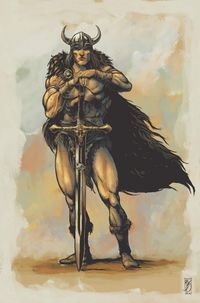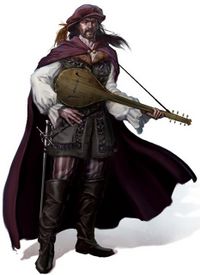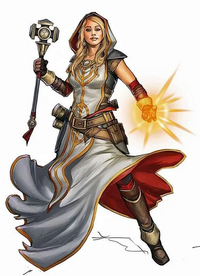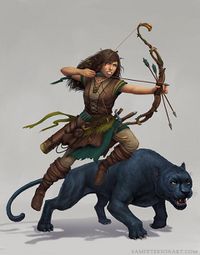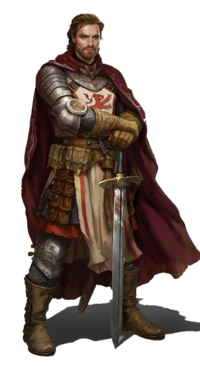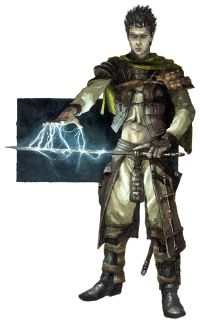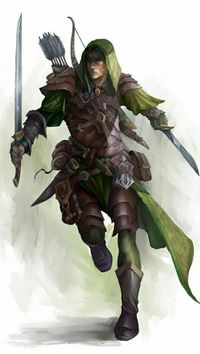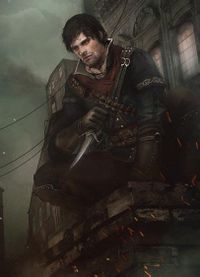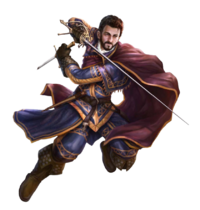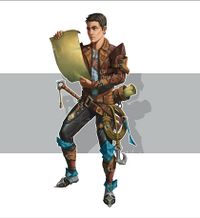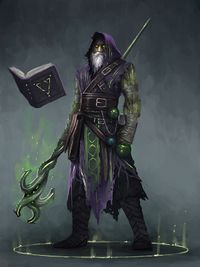Difference between revisions of "Savage Asmythe"
| Line 176: | Line 176: | ||
'''Diva''' | '''Diva''' | ||
This is a Dragon Supernatural Background common to humans. Divas use music to shape the dreams of the Elder Dragons and affect change a living person or animal. | This is a Dragon Supernatural Background common to humans. Divas use music and song to shape the dreams of the Elder Dragons and affect change in a living person or animal. | ||
* Starting Spells: 3 | * Starting Spells: 3 | ||
* Starting Spell Points: 10 | * Starting Spell Points: 10 | ||
* Spellcasting (spirit): Create a natural effect in a person or animal. Some spell effects can be maintained. | * Spellcasting (spirit): Create a natural effect in a person or animal. Some spell effects can be maintained. | ||
Using this kind of magic require at least a full minute of concentration | Using this kind of magic require at least a full minute of concentration. | ||
'''Druid''' | '''Druid''' | ||
| Line 215: | Line 215: | ||
* Artificer (S) - Enables the wizard or diva to create arcane devices. | * Artificer (S) - Enables the wizard or diva to create arcane devices. | ||
* Channeling (S) - Recover 1 spell point if you get a raise on a spellcasting test. | * Channeling (S) - Recover 1 spell point if you get a raise on a spellcasting test. | ||
* Desecrate (H) - Drain the life of all plants in a 3ft radius to recover | * Desecrate (H) - Drain the life of all plants in a 3ft radius to recover 5 spell points. This is an action when used in combat. | ||
* Drain Life (V) - Touch a dying creature and drain its life to recover 10 spell points. This is an action in combat and can not cause any wounds. | * Drain Life (V) - Touch a dying creature and drain its life to recover 10 spell points. This is an action when used in combat and can not cause any wounds. | ||
* Enchanter (L) - Enables the wizard or diva to create permanent magical effects. | * Enchanter (L) - Enables the wizard or diva to create permanent magical effects. | ||
* New Spells (N) - Learn two new spells. | * New Spells (N) - Learn two new spells. | ||
| Line 222: | Line 222: | ||
* Power Surge (N) - Recover 10 spell points when dealt a joker. | * Power Surge (N) - Recover 10 spell points when dealt a joker. | ||
* Rapid Recharge (S) - Recover 10 spell points per hour. | * Rapid Recharge (S) - Recover 10 spell points per hour. | ||
* Signature Spell (S, d10) - Select one existing spell. This arcane spell can be cast without a spell book; or dragon spell can be cast in one full round (use aim action). | * Signature Spell (S, d10) - Select one existing spell. This arcane spell can be cast without a spell book; or dragon spell can be cast in one full round (use the aim action). | ||
* Soul Drain (S, d10) - Recover 5 spell points and gain a level of Fatigue. | * Soul Drain (S, d10) - Recover 5 spell points and gain a level of Fatigue. | ||
* Specialty (S, d8) - Select a specific effect; spells using that effect get +1 on all spellcasting | * Specialty (S, d8) - Select a specific effect/trapping; spells using that effect get +1 on all spellcasting tests. | ||
* Spell Points (N) - Gain 5 additional spell points, increasing your maximum. | * Spell Points (N) - Gain 5 additional spell points, increasing your maximum. | ||
| Line 247: | Line 247: | ||
|[[File:bard.jpg|200px]] | |[[File:bard.jpg|200px]] | ||
|'''Bard''' | |'''Bard''' | ||
Bards are entertainers and spies who are as comfortable in the | Bards are travelers, entertainers, and occasionally spies who use dragon magic to spread the vision of an elder dragon. They are often as comfortable in the king's hall as they are in the bustling markets. | ||
* Attributes: Agility d8, Smarts d6, Spirit d8, Strength d4, Vigor d4 | * Attributes: Agility d8, Smarts d6, Spirit d8, Strength d4, Vigor d4 | ||
* Skills: | * Skills: | ||
| Line 253: | Line 253: | ||
* Hinderances: Loyal, Driven (minor), Mild Mannered, Cautious | * Hinderances: Loyal, Driven (minor), Mild Mannered, Cautious | ||
* Gear: Shortsword, dagger, light leather coat, basic adventure gear, lute (or other musical instrument) | * Gear: Shortsword, dagger, light leather coat, basic adventure gear, lute (or other musical instrument) | ||
* Example: | * Example: | ||
|} | |} | ||
| Line 259: | Line 259: | ||
{| | {| | ||
|[[File:cleric.png|200px]] | |[[File:cleric.png|200px]] | ||
|''' | |'''Crusader''' | ||
Crusaders are fighters driven by a purpose. They seek to change the world, making it a better place in the eyes of their elder dragon. | |||
* Attributes: Agility d4, Smarts d6, Spirit d8, Strength d6, Vigor d6 | * Attributes: Agility d4, Smarts d6, Spirit d8, Strength d6, Vigor d6 | ||
* Skills: | * Skills: | ||
| Line 272: | Line 272: | ||
{| | {| | ||
|[[File:druid.jpg|200px]] | |[[File:druid.jpg|200px]] | ||
|''' | |'''Druid''' | ||
Elven druids follow the old ways of nature and spirit. They are part of the wild lands, friend to plant and beast. They know which plants to use for potion and poison and often have animal companions. | Elven druids follow the old ways of nature and spirit. They are part of the wild lands, friend to plant and beast. They know which plants to use for potion and poison and often have animal companions. | ||
* Attributes: Agility d6, Smarts d8, Spirit d8, Strength d4, Vigor d4 | * Attributes: Agility d6, Smarts d8, Spirit d8, Strength d4, Vigor d4 | ||
| Line 298: | Line 298: | ||
|[[File:bladesinger.jpg|200px]] | |[[File:bladesinger.jpg|200px]] | ||
|'''Bladesinger''' | |'''Bladesinger''' | ||
The bladesinger is a knight with the arcane gift, trained by the | The bladesinger is a knight with the arcane gift, trained by the Eye of Horus. They don't have the focused combat training of a knight or the depth of arcane expertise of wizards but combine the two into an elite combat style. | ||
* Attributes: Agility d6, Smarts d4, Spirit d8, Strength d8, Vigor d4 | * Attributes: Agility d6, Smarts d4, Spirit d8, Strength d8, Vigor d4 | ||
* Skills: | * Skills: | ||
| Line 309: | Line 309: | ||
{| | {| | ||
|[[File:monk.jpg|200px]] | |[[File:monk.jpg|200px]] | ||
|''' | |'''Monk''' | ||
Many of the factions of The Hand of Sol have secluded monasteries where they take in the poor, sick, and rejected and give them food shelter and meaning. Most of these monks learn only basic defense or administration, a few with the gift of dragon magic are able to become formidable fighters. | Many of the factions of The Hand of Sol have secluded monasteries where they take in the poor, sick, and rejected and give them food shelter and meaning. Most of these monks learn only basic defense or administration, a few with the gift of dragon magic are able to become formidable fighters. | ||
* Attributes: Agility d6, Smarts d4, Spirit d4, Strength d8, Vigor d8 | * Attributes: Agility d6, Smarts d4, Spirit d4, Strength d8, Vigor d8 | ||
| Line 322: | Line 322: | ||
{| | {| | ||
|[[File:artificer.jpg|200px]] | |[[File:artificer.jpg|200px]] | ||
|''' | |'''Artificer''' | ||
Dwarves have developed advanced metallurgy and alchemy, drawing on arcane energy to power their industry. Dwarven artificers are able to create and use devices powered by arcane energy. | Dwarves have developed advanced metallurgy and alchemy, drawing on arcane energy to power their industry. Dwarven artificers are able to create and use devices powered by arcane energy. | ||
* Attributes: Agility d4, Smarts d10, Spirit d6, Strength d4, Vigor d6 | * Attributes: Agility d4, Smarts d10, Spirit d6, Strength d4, Vigor d6 | ||
| Line 360: | Line 360: | ||
|[[File:swashbuckler.png|200px]] | |[[File:swashbuckler.png|200px]] | ||
|'''Swashbuckler''' | |'''Swashbuckler''' | ||
Swashbucklers are smart and agile duelists. | Swashbucklers are smart and agile duelists. They often enjoy taking risks and experiencing adventure as it is told in the stories. | ||
* Attributes: Agility d8, Smarts d4, Spirit d4, Strength d8, Vigor d6 | * Attributes: Agility d8, Smarts d4, Spirit d4, Strength d8, Vigor d6 | ||
* Skills: | * Skills: | ||
Revision as of 15:00, 22 November 2021
Savage Worlds is a framework system from Pinnacle Entertainment. It is ideal for a lore heavy, narrative friendly world like Asmythe.
Any references to page numbers refer to the Savage Worlds Adventure Edition core book.
Characters
Savage Worlds character creation is designed to support archetypes, which are idealized character styles popularized by books, movies, and other kinds of fiction. For example, an elven druid with animal companions, a human paladin fighting for great good, a dwarven smith, a book and staff wizard, a tough barbarian, and many many more.
Consider what kind of character you want to play and the information below should help you create that character. At the bottom of this page is a list of sample archetypes and character builds.
Races
Humans Humans are the most common player race and form the baseline for used for other races. They are more sociable and adaptable than other races.
- Adaptable: Begin with a free novice edge of your choice.
Elves Elves are about half as tall as humans and spend most of their lives in natural surroundings. They are nomadic, stealthy, and fierce. Elves have a natural tendency toward dragon magic.
- Attribute Increase: Agility begins at d6
- Small (Size -1): Elves are child-sized by human standards.
Dwarves Dwarves are short and stout and spend most of their lives in large mountain strongholds. They have access to alchemy magic.
- Attribute Increase: Vigor begins at d6
- Reduced Pace: Due to short and stout stature Pace is -1 and running is reduced by one die type.
Other Humans, elves, and dwarves are the civilized races. All other races have, at most, a +0 total for racial abilities as described on page 18.
- Saurians (lizardfolk)
- Felinians (catfolk)
- Aquarian (seafolk)
- Avian (birdfolk)
- etc.
Traits
Traits are rated on the dice scale: 0, d4, d6, d8, d10, d12
Attributes
All begin at d4 and new characters have 5 points to raise attributes, one die type per point with a maximum of d12.
- Agility - Dexterity, coordination, reflexes
- Smarts - Intellect, perception, logic
- Spirit - Willpower, mental fortitude, charisma
- Strength - Physical fitness, muscle strength
- Vigor - Endurance, health, constitution
Skills
Every character begins with the four common skills and one knowledge skill at a base value of d4. All other skills begin at 0 and new characters have 12 points to gain and improve skills; 1 point will improve a skill one die up to the linked attribute. Untrained skill tests, skill level 0, are made at d4-2.
Common Skills
- Athletics (strength) - Gross motor skills and skills based on physical strength: Climb, Swim, Run, Jump.
- Common Knowledge (smarts) - Local knowledge, local history, local geography, local politics, etc. Anything a typical resident could know.
- Notice (smarts) - The ability to perceive something out of place, somebody sneaking, or otherwise unexpected. Also use this skill to recognize that something not-obvious and non-hidden is significant.
- Profession (smarts) - Select a professional skill such as cooking, sailing, driving, mercantile, blacksmithing, coopering, cobbling, busking, cartwright, etc. Each professional skill represents the collection of knowledge and activities used to practice that profession.
General Skills
- Adventuring (smarts) - The accumulated experience of adventuring in strange and dark places. This skill can be used to gauge how dangerous an unknown situation is and provide intuition about the unexplained.
- Animals (spirit) - Dealing with tame and wild animals. Training them, riding them, sensing their needs or intentions, etc.
- Battle (smarts) - Tactical and strategic planning for ambushes, large battles, siege warfare, etc.
- Coordination (agility) - Balance and fine motor skills: walking a tight-rope, juggling, legerdemain.
- Deduction (smarts) - Investigation and logical thinking, used to follow a trail of clues or solve puzzles. Use this skill any time the book references "Research".
- Engineering (smarts) - Knowledge of basic mechanical systems including construction and basic mechanisms. Use this to build or repair bridges, tunnels, siege engines, mechanical traps, etc. This is not modern engineering, is is classical medieval engineering.
- Healing (smarts) - Identify ailments, craft and apply healing ointments, set splints, cure poison, etc. Use this skill to deal with any non-magical physical damage or affliction.
- Intimidation (spirit) - Using insults, taunts, threats, and aggressive language to coerce another person to do or say something they don't want to do.
- Occult (smarts) - Knowledge of the cosmology, elder dragons, the ilthura, elementals, etc. Use this skill to decipher runes, recognize magical effects, and identify curses.
- Performance (spirit) - Performing for an audience: acting, singing, dancing, playing an instrument, etc.
- Persuasion (spirit) - The ability to convince others to agree to do or say something willingly through negotiation, politics, or deception.
- Philosophy (smarts) - Knowledge of other cultures; their history, language, etc. Use this skill to translate languages, understand foreign traditions, etc. This is most useful for humans who expect to encounter dwarves or elves.
- Stealth (agility) - Move silently, hide, camouflage, and other sneaking stealthy things.
- Survival (smarts) - The knowledge and practice of wilderness survival: navigation, hunting and gathering, build camps and shelters, predicting weather, etc.
- Thievery (agility) - Dishonest work: pickpocketing, lockpicking, etc.
Combat Skills
- Archery (agility) - Ranged weapons such as bows, crossbows, and bolos. Use this whenever the book references "Shooting".
- Melee (agility) - Attack and defense in close quarters using any kind of weapon or improvised weapon. This includes punching, boxing, wrestling, and martial-arts.
Magic Skills
Requires a Supernatural Background that determines what kind of magic you can uses. Your skill determines how you use magic, either casting spells dramatically or using rituals to create long lasting effects.
- Spellcasting - The skill of using, identifying, and interpreting magical powers and effects. The linked attribute depends on the kind of magic. Ilthura/arcane magic uses Smarts, Dragon magic uses Spirit.
Hindrances
You may and should take up to 4 points in hinderances. Roleplaying hinderances is a powerful way to get extra bennies; you should have one hinderance that directly affects traits and the remaining points in personality and role-playing hinderances.
- 2 points can raise an attribute one die or choose an edge.
- 1 point can improve a skill one die or gain additional starting equipment.
These hinderances are not available in this setting:
- All Thumbs
Edges
Characters get edges from Hinderance points or from advances, aka "leveling up".
Wealth
Asmythe uses an abstract wealth system, removing the need to count coins and inventory your inventory. This system assumes that characters have easy access to their wealth or are able to issue IOUs that will be honored by the Tridale Trade Company or local oligarch.
We also don't keep track of expendable items such as arrows, bolts, torches, rations, etc. But a critical failure or dramatic conditions could indicate that supplies have run out.
Wealth is a trait that ranges from 0 to d12, just like other traits. Most characters start with basic adventuring gear and d6 wealth, which is enough to have residence at a local inn or a room in a shared residence. Wealth tests use the wild die just like any other trait test.
Wealth tests are modified by the quality and rarity of the purchase and the prosperity of the local economy. These modifiers stack.
- A success means the purchase can be made, but it reduces the wealth trait one level. If wealth would be reduced below 0 then the purchase can't be made.
- A raise means the purchase can be made without reducing wealth.
- A failure means the purchase isn't possible. The item can't be found or you can't afford it.
Each level of wealth has two values, pocket and limit, that determine what purchases can be made. Any purchases less than pocket value can be made without a wealth check; the cost is too small to note. Any purchase above the limit is too expensive, the character can't afford this purchase without selling some property. A purchase that is more than pocket and less than limit, requires a wealth test. Sum all purchases in a short amount of time, usually a day or two, to find the total value of the shopping trip and use this value to determine if a wealth test is necessary.
| Wealth | Description | Pocket Value | Purchase Limit |
|---|---|---|---|
| 0 | Beggar | $0 | $25 |
| d4 | Peasant | $10 | $100 |
| d6 | Commoner | $50 | $500 |
| d8 | Freeman | $150 | $2000 |
| d10 | Lord | $450 | $5000 |
| d12 | Noble | $1000 | $10,000 |
Purchasing Modifiers
| Economy | Quality | Rarity | Modifier |
|---|---|---|---|
| City | Low | Very Common | +1 |
| Town | Standard | Common | +0 |
| Village | High | Rare | -1 |
Whenever you gain a financial reward, such as from an adventure or quest, you may either spend it on a shopping spree or increase your wealth, but not both.
- Shopping spree: Spend some or all of the reward on purchases. Any remaining after the shopping spree becomes part of your wealth without affecting the trait.
- Increase Wealth: If the amount of the reward is greater than the limit of the next higher wealth level then wealth increases. Wealth becomes the highest level that has a limit less than the reward. Increasing wealth does not confer any property or holdings, as you would get from Edges.
For example, after defeating Bullnose Bill and his band of ruffians the pair of adventurers each receive a reward worth $1000. Tom recently purchased a new set of armor and his current wealth is a d4; he chooses to use all of his reward to increase his wealth level back up to d6 ($1000 > $500). Jerry already has d6 wealth and goes on a shopping spree, she spends $750 and the remaining $250 becomes part of her existing d6 wealth.
Edges and Hinderances
- Poverty - wealth is d4 and the character lives day-to-day. They often sleep in the gutter, stables, or at a boarding house.
- Rich - increase wealth to d8 and the character has a house, a small farm, a small shop, or similar.
- Filthy Rich - increase wealth to d10 and the character has a small estate, trading house, noble title, or similar.
Equipment
Characters begin with basic adventure gear, basic equipment, and d6 wealth.
Basic Adventure Gear
- Backpack
- Bedroll: wool blanket wrapped in a waxed canvas tarp
- Casual clothes
- Mess kit: cup, cutlery, field knife
- Tinderbox
- Torches
- Travel boots and cloak
- Travel rations
- Twine
- Water canteen
- One weapon (sword, staff, axe, mace, bow, etc.)
- A light leather coat (armor +1)
- Appropriate professional gear such as a spell book, holy symbol, lockpicks, etc. (GM approval)
Supernatural Powers
Supernatural traits can be either arcane or dragon. The page on Magic describes each in great detail. Throughout this section powers are referred to as "spells".
Backgrounds
Alchemy This is an Arcane Supernatural Background common to dwarves. Dwarven alchemy is the ability to create magical devices by making pacts with elementals. These devices only work for the dwarf who created them.
- Starting Spells: 2
- Starting Spell Points: 15
- Spellcasting (smarts): Use, create, and repair a dwarven device.
Alchemy spellcasting works similar to Weird Science on page 148.
Diva This is a Dragon Supernatural Background common to humans. Divas use music and song to shape the dreams of the Elder Dragons and affect change in a living person or animal.
- Starting Spells: 3
- Starting Spell Points: 10
- Spellcasting (spirit): Create a natural effect in a person or animal. Some spell effects can be maintained.
Using this kind of magic require at least a full minute of concentration.
Druid This is a Dragon Supernatural Background common to elves. Druids channel the dreams of the Elder Dragons to mold and change nature. Druid brew potions and perform rituals, they are not skilled at fast and dramatic magic.
- Starting Spells: 2
- Starting Spell Points: 15
- Spellcasting (spirit): Create potions, divining rods, and other natural "arcane device" as described on page 153.
Sorcery This Supernatural Background is common to hobgoblins but may exist in any race. Sorcery is the untrained and undisciplined use of dragon or arcane magic. Most sorcerers don't have the skill or knowledge to create more than a single magical effect. Spells have the same restrictions that any other spell of the same type has: arcane spells summon elemental energy and dragon magic affects living things.
- Starting Spells: 1
- Starting Spell Points: 20
- Spellcasting (smarts/spirit): Create an effect. The linked attribute depends on the type of magic.
Sorcery works like the Gifted arcane background on page 148.
Wizardry This is an Arcane Supernatural Background common to humans. Wizardry is the ability to use the Ilthura language to summon elemental energy. Wizards must have access to their spell book to use a spell.
- Starting Spells: 3
- Starting Spell Points: 10
- Spellcasting (smarts): Create an elemental effect.
Spells
Spells are listed in the core book and are available to characters with the appropriate magic background, determined by effect.
Spell Effects
In the core book these are described as "trappings". Whenever a spell is learned the effects of that spell are chosen and remain the same every time that spell is used.
Spell Modifiers
All those listed in the core book, page 152, in addition to those below. Spell modifiers, if any, are selected when a spell is cast.
- Mutate (+1) - Change the effect/trappings of the spell as it is cast.
Spell Edges
This list replaces those in the core book. Requirements are in parentheses, all require a supernatural background, obviously.
- Artificer (S) - Enables the wizard or diva to create arcane devices.
- Channeling (S) - Recover 1 spell point if you get a raise on a spellcasting test.
- Desecrate (H) - Drain the life of all plants in a 3ft radius to recover 5 spell points. This is an action when used in combat.
- Drain Life (V) - Touch a dying creature and drain its life to recover 10 spell points. This is an action when used in combat and can not cause any wounds.
- Enchanter (L) - Enables the wizard or diva to create permanent magical effects.
- New Spells (N) - Learn two new spells.
- Prestige (S) - Learn a new spell which is a combination of two spells that can only be cast together as a single spell.
- Power Surge (N) - Recover 10 spell points when dealt a joker.
- Rapid Recharge (S) - Recover 10 spell points per hour.
- Signature Spell (S, d10) - Select one existing spell. This arcane spell can be cast without a spell book; or dragon spell can be cast in one full round (use the aim action).
- Soul Drain (S, d10) - Recover 5 spell points and gain a level of Fatigue.
- Specialty (S, d8) - Select a specific effect/trapping; spells using that effect get +1 on all spellcasting tests.
- Spell Points (N) - Gain 5 additional spell points, increasing your maximum.
Character Archetypes
Archetypes are similar to classes in other RPG systems, but instead of strictly defining character abilities they describes what characters are like. There are many more archetypes than I have listed here and players may create their own characters and backstory in whatever style they like.
